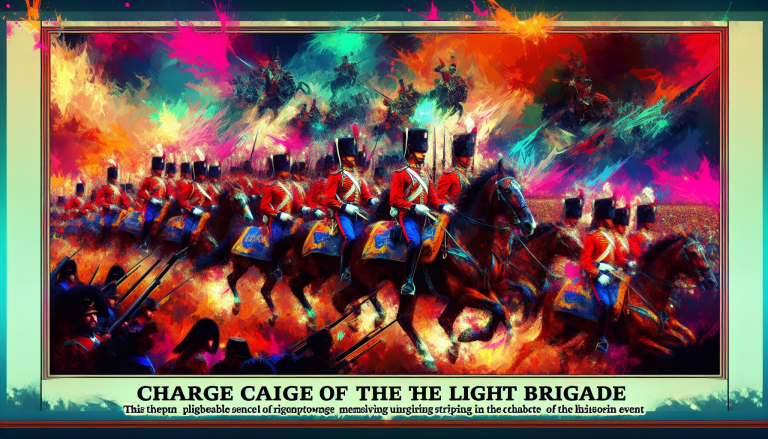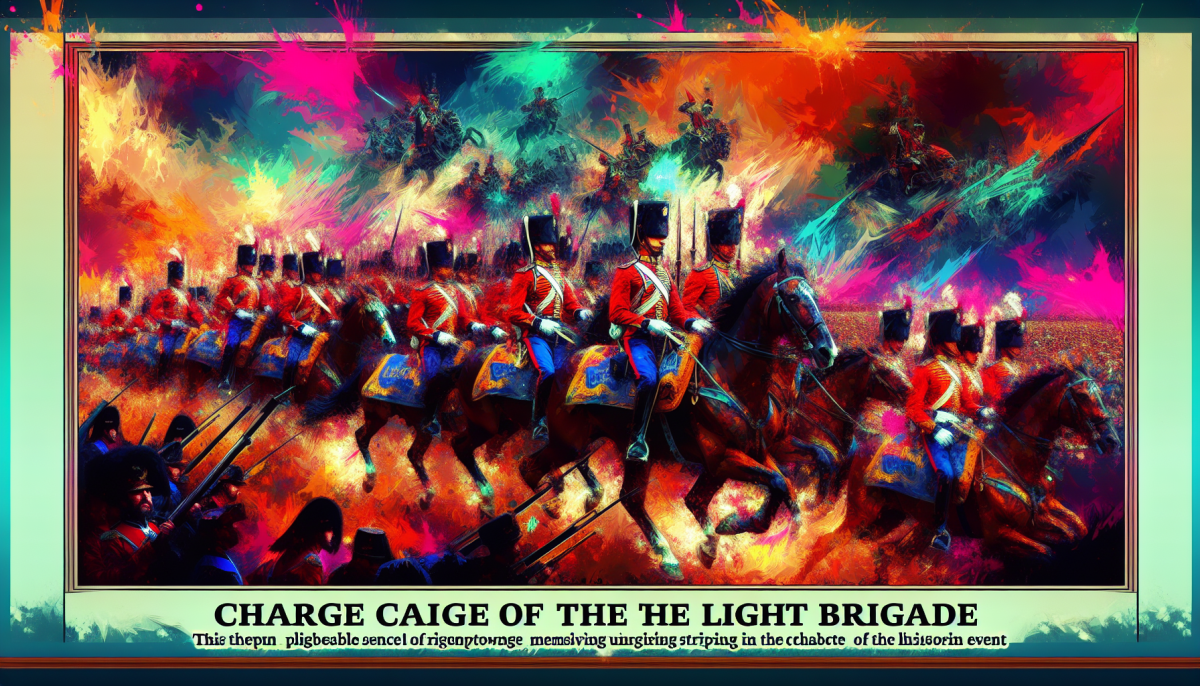Beating a Dead Horse: The Hilarious Story of the Charge of the Light Brigade
In the annals of military history, few incidents capture the essence of futility quite like the ill-fated Charge of the Light Brigade during the Crimean War. This legendary blunder, immortalized in Alfred, Lord Tennyson’s stirring yet darkly comedic poem, is a shining example of how even the most heroic of intentions can descend into the realm of the absurd.
The year was 1854, and the British forces, led by the ever-confident Lord Raglan, were engaged in a fierce battle against the Russian army near the town of Balaclava. Amidst the chaos of the battlefield, a series of garbled orders led the Light Brigade, a cavalry unit of around 600 men, to receive the fateful command to charge directly into the mouth of the enemy’s artillery.

As the hapless troopers spurred their horses forward, their commander, the equally hapless Lord Cardigan, led the charge with his customary flair for the dramatic. Perched atop his magnificent steed, Cardigan must have felt a surge of patriotic fervor as he and his men galloped towards certain doom. Sadly, his enthusiasm was not shared by the enemy, who greeted the charge with a devastating barrage of cannonfire.
Beating a Dead Horse, Literally
The carnage that ensued was as comical as it was tragic. Horses and riders were cut down in droves, their valiant efforts reduced to a macabre dance of death. And yet, even as the Light Brigade was being decimated, Lord Raglan, oblivious to the unfolding disaster, continued to send orders for the brigade to charge, effectively “beating a dead horse” in the most literal sense.
One can almost picture the scene, with the beleaguered troops struggling to make sense of the increasingly nonsensical commands, their efforts to retreat or regroup thwarted by the sheer absurdity of the situation. It’s a testament to the human capacity for perseverance, or perhaps sheer stubbornness, that the Light Brigade continued to advance, even as their numbers dwindled and the odds of survival grew ever more slim.
The Humor in Futility
In the aftermath of the Charge of the Light Brigade, the military establishment was left to grapple with the consequences of their blunder. The public, however, found solace in the sheer comedic value of the event, with satirists and humorists gleefully skewering the incompetence of the leadership and the dogged determination of the troops.
One particularly scathing cartoon from the time depicted Lord Raglan, oblivious to the carnage unfolding before him, calmly sipping tea while barking orders to the beleaguered Light Brigade. The caption read, “Beating a dead horse to a jelly.” The image perfectly captured the essence of the futile effort, transforming a tragedy into a darkly humorous commentary on the absurdities of war.
Similarly, the aforementioned Tennyson poem, while celebrating the bravery of the Light Brigade, also manages to inject a touch of wry humor into the proceedings. In one particularly memorable line, the poet laments, “Into the valley of Death / Rode the six hundred.” The sheer deadpan delivery of this line, combined with the knowledge of the doomed charge, creates a delicious sense of irony that is hard to resist.
Beating a Dead Horse, Again and Again
The Charge of the Light Brigade has become a touchstone for the phrase “beating a dead horse,” a metaphor for any futile effort that continues long after it has become clear that the endeavor is doomed to failure. Over the years, the phrase has been applied to everything from political campaigns to corporate restructuring efforts, each time evoking the image of the beleaguered troopers charging into the valley of death.
In a particularly amusing example, a 1980s-era cartoon depicts a group of businessmen frantically wielding whips and clubs in a vain attempt to revive a thoroughly deceased equine. The caption reads, “Beating a dead horse to increase productivity.” The image perfectly captures the absurdity of continuing to pursue a course of action that has clearly reached the end of its usefulness.
Similarly, in the realm of politics, the phrase has been used to deride the efforts of politicians who stubbornly cling to failed policies or outdated ideologies. During the 2016 US presidential election, for instance, pundits and commentators frequently invoked the image of “beating a dead horse” when discussing the futile attempts of certain candidates to revive their flagging campaigns.
Lessons in Humility
Ultimately, the Charge of the Light Brigade and the enduring legacy of the “beating a dead horse” metaphor serve as a cautionary tale about the perils of hubris and the importance of recognizing the limits of one’s own abilities. The leaders who sent the Light Brigade to their doom were blinded by their own sense of invincibility, unable to see the folly of their actions until it was too late.
In the same vein, those who continue to “beat a dead horse” in their personal or professional lives are often clinging to a false sense of control, unwilling to admit defeat and move on to more productive endeavors. The humor in these situations lies in our shared recognition of the human tendency to stubbornly persist in the face of overwhelming evidence that our efforts are futile.
As we look back on the Charge of the Light Brigade and the countless other examples of “beating a dead horse,” we are reminded that the path to true wisdom often lies in the ability to laugh at our own foibles and shortcomings. By embracing the humor in our failures, we open ourselves up to the possibility of growth, change, and the pursuit of more meaningful and fulfilling goals.
